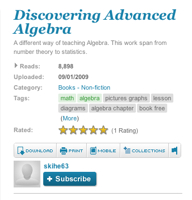 Scribd is working hard to be the text version of YouTube. Upload some text, tag it, and let the world discover it. It isn’t just unpublished novels – many copyrighted textbooks are already there via unauthorized uploads.
Scribd is working hard to be the text version of YouTube. Upload some text, tag it, and let the world discover it. It isn’t just unpublished novels – many copyrighted textbooks are already there via unauthorized uploads.
Like YouTube, users can upload anything and the site isn’t under any legal obligation to screen for copyright protection. Copyright holders have to proactively scan and search for their content. Get it taken down today – it can be uploaded again tomorrow morning.
For example, Key Curriculum Press’s “Discovering Advanced Algebra” is available for anyone to download all 888 pages for free (and has been since last August when it was posted by “skihe63”). It has been accessed 8,898 times since it was loaded less than a year ago. It is an older copyright, but still – on Amazon it sells for $25. That is $222k in value.
This isn’t just Key Curriculum Press’s (fixed) problem – they are algebra texts from McGraw-Hill, University of Chicago Press, and many other publishers a click away.
 “Gee – nice copyright you have there. Be a shame if anything happened to it.”
“Gee – nice copyright you have there. Be a shame if anything happened to it.”
What are Key Curriculum’s (fixed) options? They should submit a report to Scribd to remove the illegal copy (and hopefully they will – edit THEY DID). But that just solves it for this one instance – today.
The only way to get Scribd to protect your copyright is to cut them in on the action. Upload your content, and let users download the PDF for a fee which you share with Scribd. Then, and only then, will they screen for unauthorized copies.
So publishers are starting to up load their own content and cut Scribd in on the action – protection money if you will.
While Scribd has the Milleneum Copyright Act law on their side it sure feels like they are doing something immoral. Once they are on notice about a copyrighted material they should be obligated to screen for it. Key Curriculum’s (fixed) unambiguous notice is right on page 3 and it explicitly prohibits reproducing it, storing it, or transmitting it without permission.
How it Should Work
Technically, scanning text for a copyright notice is a trivial exercise. If TripIt can decode 95% of the confirmation emails I get from a wide variety of travel providers this is child’s play.
You would think that if Scribd wants publishers to be allies that they would scan for copyright notices and require up-loaders to explicitly acknowledge by publisher name that they have authorization (not some dense generic mealy mouthed legalese that is deliberately designed to be ignored). A dialog like “We detected that Key Curriculum Press holds a 2004 copyright on these materials – click here to acknowledge that you have the publishers written permission to transmit these materials to our servers. Violations of copyright law can expose you to personal liability.”
Hell – they could go a step further and provide a link to request permission from the named publisher.
But don’t hold your breath on Scribd doing the right thing on this score – there is money to be made in playing it fast and loose with other people’s property.
Conflicting Values
We know from market after market that increased exposure grows the market – but it often does so in ways that are highly disruptive to existing distribution mechanisms. The music business isn’t hurting right now – music publishers are. Movie attendance went UP after HBO went on-line in the early ’80’s.
The trick for publishers is to figure out how to surf this transition and to see opportunities in challenges. If we reflexively try to fight folks who are playing too cute with our property but who have the law on their side we are going to lose.
As a netizen I find my value for free and open access to information is coming into direct conflict with my publishing hat. I want the hard work put in by the writers, editors, designers, instructional designers and others involved in the creation of our intellectual property to be able to continue providing high value.
There are no easy answers – we will have to hire people to monitor this new world for us and our web marketing teams need to figure out how to align with sites like Scribd rather than fight them.
———————
Hat tip to Tim McHugh at Saddleback for sharing their approach and thoughts on this topic with me.
Note: I mistakenly attributed the Algebra title in the piece originally to Pearson’s Modern Curriculum Press – I knew better and the good folks at Key Curriculum Press were good natured about it. The references have been fixed.
 The Education Business Blog
The Education Business Blog

